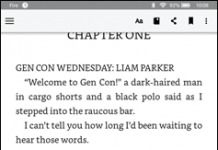 Publishing Perspectives has summed up a keynote given by “wunderkind” Alec Ross at the Arab Publishers Conference. If his comments on DRM and Edward Snowden are as bizarre as quoted, I can do nothing but shake my head. Publishing Perspectives is a very well-regarded industry publication. Reached today, veteran reporter Roger Tagholm is standing by the quote.
Publishing Perspectives has summed up a keynote given by “wunderkind” Alec Ross at the Arab Publishers Conference. If his comments on DRM and Edward Snowden are as bizarre as quoted, I can do nothing but shake my head. Publishing Perspectives is a very well-regarded industry publication. Reached today, veteran reporter Roger Tagholm is standing by the quote.
I’m not sure who this Alec Ross is beyond his LinkedIn listing and a Wikipedia entry, which tells of his State Department activities under then-Secretary Hillary Clinton. But if he’s considered a “wunderkind” for having new and original ideas about the publishing world, I’m not impressed. Granted that I’m judging by excerpts and a summary at second hand (I wasn’t able to find a video or text of the full keynote from Googling either), but it sounds like a lot of the same old hooey to me. Please note that Roger Tagholm says Ross did not use the term DRM per se. But Ross was obviously referring to it since he talked about encryption and anti-piracy precautions.
Publishing Perspectives quotes Ross as saying:
“Some of the developments in data compression are extraordinary. We are moving towards a world in which a 400-page book can be compressed to the ‘weight’ of a text message. So, imagine a day when you are reading a Facebook post from a friend who mentions this great book they’ve just read, and imagine being able to click on the title and have it sent to your device or printer. Thanks to Edward Snowden, we’ve learnt the importance of encryption, so the book will be encrypted so it can’t be pirated. I feel very optimistic about these developments.”
He says various other things, but that was the big one that struck me.
 How can you “compress” a 400-page book to something the size of a text message? File compression ratios don’t work that way. But is that even what he means? What does it mean when you quotate ‘weight’ like that? Is he talking about sending a text message with the link to a larger book file on a server? If that’s the case, why doesn’t he just say so? It’s not as if texting links to files is anything new. We’ll also want to know why the book would be encrypted if the file was transmitted user to user. Was it part of a viral distribution scheme, with provisions for compensation for the publisher? Or going to a someone in a place with a snoopy dictatorship with a penchant for piracy (humor alert)? Or was this just encryption for encryption’s sake?
How can you “compress” a 400-page book to something the size of a text message? File compression ratios don’t work that way. But is that even what he means? What does it mean when you quotate ‘weight’ like that? Is he talking about sending a text message with the link to a larger book file on a server? If that’s the case, why doesn’t he just say so? It’s not as if texting links to files is anything new. We’ll also want to know why the book would be encrypted if the file was transmitted user to user. Was it part of a viral distribution scheme, with provisions for compensation for the publisher? Or going to a someone in a place with a snoopy dictatorship with a penchant for piracy (humor alert)? Or was this just encryption for encryption’s sake?
And then there’s that nonsense about Edward Snowden and encryption. I hardly even know where to start.
E-book stores have been encrypting e-books ever since the first commercial formats were born, back in the ‘90s—because the publishers insisted. And if Ross honestly thinks that encrypting e-books can keep them from being pirated, he doesn’t know what he’s talking about. As Cory Doctorow explained all the way back in 2004, the whole idea of secure digital rights management on e-books is fundamentally flawed, because the person who is meant to decrypt the encrypted message is also the cryptographic attacker. As long as that remains true, no system of e-book encryption will be invulnerable.
But no, now encrypted e-books will be secure because of Edward Snowden.
Can we maybe just fast-forward a decade or two to when more publishers have come to the same conclusion as Baen, O’Reilly, and Tor—that encryption really doesn’t help “protect” e-books and just gets in the way of the consumer? I’m getting really tired of these publishers and their “wunderkind” who want to keep living in the past.
Update: The Arab publishing conference apparently is not the first time Ross has uttered a DRM-related whopper.
Further update: Post was amended to include Publishing Perspectives’s take on the quote and other refinements. TeleRead Publisher David Rothman contributed to the update.
Photo credit: Image of Ross via Wikimedia Commons. “Alec Ross” by Alec Ross – Alecross.com. Licensed under CC BY 4.0 via Commons.


































I assume that he’s talking about compressed QR Codes where you can store about 4 Mb of data.
@Bob: 4MB of data in what space, as far as the transmitted file? What’s the compression ratio? Would the compression work with a file transfer via Facebook, and would the integrity of the text be completely preserved—especially if the container were the size of a typical text message? Got any cites to which you can link? That said, it’s still odd to link encryption-related precautions against e-book piracy with private file exchanges. Thanks! David
Addendum:
1. I’m talking about the Snowden mention when I refer to the linking of anti-piracy stuff with the privacy angle.
2. At a more macro level, in fairness to Alec Ross, let me say he has been involved in digital divide issues, something very dear to me. Ideally he can also take a more progressive stance in regard to e-book DRM.
In a world where Al Gore invents the Internet and a senator from Alaska can see it made of “tubes,” its certainly possible to compress War and Peace into a 128-character text message. But then there’s the real world.
Encrypting books is a bit like the easily ‘bumped’ lock on many homes. It only prevents break-ins by those who don’t know the tricks. Lock bumping here: